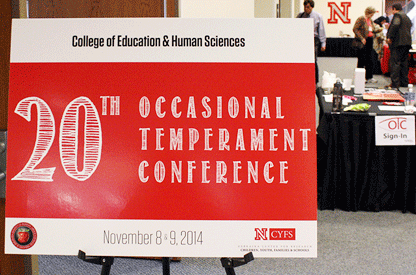
The pioneers of modern temperament research, psychiatrists Alexander Thomas and Stella Chess, identified nine traits present at birth that influenced children’s development. Half a century later, temperament research continues to play a key role in unlocking children’s behavioral diversity.
The University of Nebraska-Lincoln was center stage for recent temperament discussions as researchers, students and practitioners converged for the 20th Occasional Temperament Conference (OTC). The event drew participants from across the country and world, while also highlighting Nebraska’s leading role in classroom temperament research.
CYFS affiliate Kathleen Moritz Rudasill hosted the two-day conference, which featured sequential symposiums, poster presentations and networking opportunities. The OTC is a central event for the 350-member Temperament Consortium, a worldwide group for those interested in temperament. Termed “occasional” due to its roughly biennial schedule, the conference merges research and application.
Keynote speaker Jack Bates, professor of psychological and brain sciences at Indiana University, recognized Nebraska as “the hub” of temperament research in schools. UNL’s temperament studies focus on children’s academic success, engagement and relationship building in the classroom.
“It is an honor to be known as leaders in classroom temperament research,” Rudasill said. “Our research is focused on the ways that classrooms and schools can work with children’s temperament to optimize outcomes and, in early childhood in particular, help establish a positive academic trajectory.”
Rudasill, a UNL associate professor of educational psychology, organized an OTC symposium titled “Temperament in the classroom and school.” Her interest in temperament research reflects personal experience. As a former teacher, she was interested in studying student-teacher relationships and was acutely aware that some children’s personalities made it easier for them to form positive relationships and adjust to the demands of school.
“In terms of understanding children’s school success, temperament was one of the missing pieces of the puzzle when I started graduate school, and it is still an area to find missing pieces,” Rudasill said. “It is exciting to see the field of temperament expand and inform our understanding of children’s behavior and success in the classroom.”
Colleagues share her enthusiasm for new developments in temperament research, including Sarah Harkness, professor of human development, pediatrics and public health with the University of Connecticut. Harkness is a cross-cultural researcher who is currently studying biological measures of stress in babies, comparing infants from the Netherlands and the United States. Her involvement with the OTC spans 20 years and she appreciates the group’s common focus.
“We have a tradition of welcoming diverse approaches to temperament, but everyone is interested in the ‘so what’ questions,” Harkness said. “We’re seeing a trend in sophisticated research that combines biological with behavioral and contextual factors. These new approaches allow us to understand internal processes and gain a deeper perspective of temperament.”
Temperament research has also garnered international interest. The 20th OTC included researchers and practitioners from Spain, Mexico and Poland. Psychologist Sean McDevitt, whose work includes the Carey Temperament Scales, envisions global partnerships as the bedrock for temperament study.
“We’re planting seeds for professionals in many different countries,” McDevitt said. “The OTC provides a key platform for us to meet and share insight. Our goal is continued collaboration in order to expand our research base and apply our findings.”
For further information about the OTC, the Temperament Consortium or temperament research being conducted at UNL, contact Kathleen Moritz Rudasill at krudasill2@unl.edu.
More details at: http://go.unl.edu/eu6s